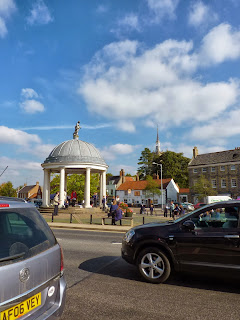After a brilliant afternoon, rain came in the night and today is much cooler. 62 this morning, and not much above that now. But after a cloudy morning, we've had a bright blue sky.
We started the day with a power outage. This one was planned. Well, actually, so was the outage yesterday. Apparently the power company is doing maintenance, so that's a good thing, right? It just makes for a few awkward hours as we figure out what to do with our power-less time. I mostly used it for cleaning, or at least, cleaning where I could see well enough to do it. And painting. I've got several projects in the pipeline so I got them into places where I had some light and could work.
Plenty of light outside!
Today, I continued with cleaning, and decided to sort out my husband's dresser drawers. No matter that I sort and fold his clothes for him to put away, he manages somehow to unfold them and then stuff them willy-nilly into the drawers. And new socks and t-shirts don't seem to convey the message to get rid of the old ones, so I had a lovely clean-out, and he now has much more space. And everything organized. I wonder how long that will last.
It is funny how different we are about some things. I want my dresser neatly organized, and when I was working I even had my closet organized by color. I like my kitchen the same way, and everything put back in the same place so I can easily reach for what I need. The same holds true for my work areas in my ebay room and the furniture workroom. Although to most people my ebay room probably looks like chaos, it's organized chaos and I can usually find what I need quickly.
In the other workroom I try to keep my worktable and cabinets of paint, screws, nails etc organized, with clear space to actually, umm, work. But unfortunately I have to share the space with Larry, and he cheerfully spills over into my space until there is literally no room for me. The table will be covered, the cabinets open and things pulled out, nails and screws on the floor, the pegboard empty of tools. He's the kind that likes to have everything out where he can see it--so like my mother that it's a wonder the two of them weren't blood relatives! We both get things done, and I constantly marvel at how he manages to do so in such a cataclysmic mess. But there it is--he does.
All this reminds me of the old folktale of the husband and wife that decided to trade jobs for a day. The man was so sure his wife had an easier time of it, you see, and that he would do her work with no trouble at all. Here's the story--this version is from the National Museum of Wales, but there are other versions. Most agree that the story originated in Sweden.
The Farmer Who Does His Wife's Housework
Lewis T Evans (1882-1975)
There was an old farmer, and his wife could not please him at all with the housework, and no food pleased him, nor doing anything at all. But one day she says to him:
'Good gracious, John! You shall work in the house tomorrow and I shall go with the servants.'
'All right', he said, 'I'll set you a good example.'
And that's what happened. The woman went out next morning with the men, and he went at it. He had to churn to begin with. There was a churn in the house, and there was a cow that needed to be taken to a piece of land by the side of the house. And there was a big cliff there, and he was afraid she would fall over it. And what did he do but tie a rope round her horns and put a rope down the chimney and tied it round his leg. And then he went to churn. He left the churn for a little while and the sow came in and turned it over. He took a floor brush and killed the sow dead.
And it was high time for him to make dinner by then. He thought of making porridge. He put the pot on the fire, with water and oats in it. And lo, the cow went over the cliff and pulled him up the chimney.
And the men came home - the wife as well - and the first thing they saw was the cow hanging over the cliff. And they came into the house and they cut the rope, and what did they see but the sow dead in the middle of the butter milk, and the old farmer had come down the chimney head first into the pot of porridge. Source: https://museum.wales/collections/folktales/?story=12
In other versions, the husband puts the cow on the roof of the house--the house had a grass roof, like some in northern Europe and Iceland.
Well, I have to admit, my man is very good at housework. He can cook, clean, sweep, do laundry and almost all the things I do, while I on the other hand cannot, or really don't want to, do the things he does, like tractor work, roof repair, plumbing, etc. etc. So I try not to complain about his messy ways. It works for him, and that's all that matters, right? I promise I'm not gritting my teeth as I type!






















